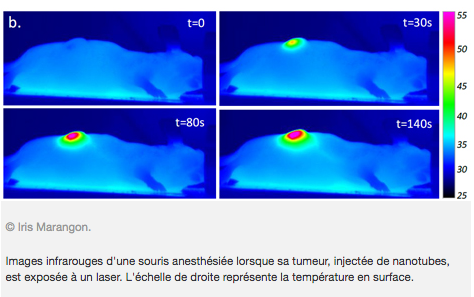French researchers have developed a precision method for destroying tumors using heat. In mice, the results are promising.

Are temperature changes the Achilles heel of tumors? By heating them, or on the contrary by freezing them, it is possible to effectively destroy these clusters of cancer cells. For several years, alternative methods to conventional surgery have been developed and used in operating theaters. One of them developed by a team from CNRS, Inserm, Université Paris Descartes and Université Paris Diderot is described in the newspaper Theranostic.
This strategy designed by French scientists consists of softening malignant tumors by heating them using carbon nanotubes injected directly into the tumor masses. These compounds are then activated by a laser. Thanks to this technique called nanohyperthermia, only cancerous tissue is affected.
Tested in mice, this precision non-invasive method has been shown to be effective. By heating the tumors to 52 ° C for 3 minutes, the researchers indeed observed a softening of the latter the days following the sessions.

Tackle the structure of the tumor
They explain, however, that this heat treatment is not enough to fight cancer. By denaturing the collagen fibers that make up tumors, the heat allows them to break down their microenvironment and would make them more sensitive to other treatments. So nanohyperthermia by attacking the structure of tumors could serve as adjunct therapy to chemotherapy.
Making tumors more vulnerable by sudden changes in temperature is a process used in other thermotherapies. With cryotherapy, a method that freezes the tumor with Argon gas until it is destroyed, doctors can detonate the tumor. The dead cancer cells are then naturally eliminated by the body.
Using radiofrequency or microwave scalpels, interventional radiologists insert needles very precisely into the tumor to heat it. The temperature can rise to over 100 ° C. These techniques are used today allow the ablation of many tumors (breast, kidney, liver, etc.) as well as the elimination of metastases, especially in bones where conventional surgery is too complicated or risky.
.















